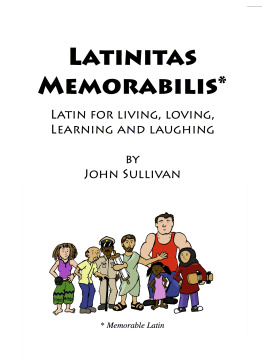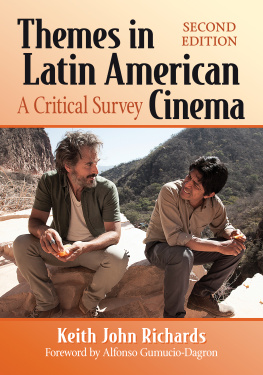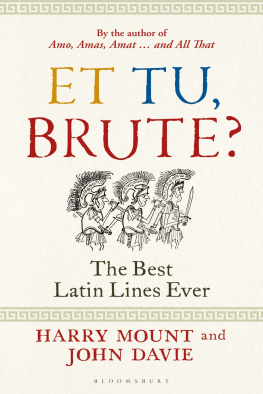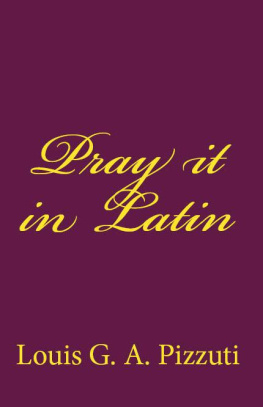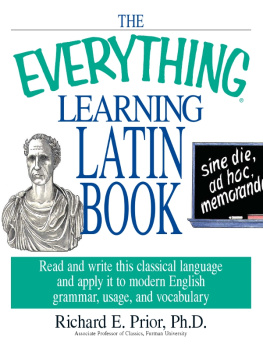Latinitas
Memorabilis
Latin for living, loving,
learning and laughing
by
John Sullivan
apocryphile press
BERKELEY, CA
Apocryphile Press
1700 Shattuck Ave #81
Berkeley, CA 94709
www.apocryphile.org
2014 by John Sullivan
All rights reserved
Printed in the United States of America
ISBN 9781940671550
eISBN 978-1-944769-06-2 (Kindle)
eISBN 978-1-944769-07-9 (ePub)
Ebook version 1.0
Illustrations by Rickard Stenberg


Contents
Latin Sayings, Wisdom of the Ancients and the Not So Ancient
Translations into Latin of Sayings in English from Myself and Others
Introduction
Fratres Sororesque (Brothers and Sisters),
This book originated as the Latin for the Week that I added to the announcements I made at the Sunday Service of Unity of Berkeley. The reaction to it was surprisingly positive. For some people it reminded them of their high school days when they enjoyed Latin. Others thought it was just amusing. Then it became a weekly e-mail to friends and associates throughout the San Francisco Bay Area and elsewhere.
Now I present it to you with both Latin sayings with an English translation and English sayings with a Latin translation. The Latin will always appear first. Some of you may want to cover the English to see if you can translate the Latin, yourself. Thats one way to have fun with this book.
You will notice that there are more translations into Latin than out of that language. Thats because it is more fun for me that way and more of a challenge.
Since I was born and raised in the Roman Catholic Church, Latin had been with me since the time a priest poured water on me and said, Ego te baptizo Every Sunday there was a whole lot of Latin in church including Hoc est enim corpus meum said by the priest leaning over the altar with his back to us.
Then every few weeks in the confessional box I was relieved to hear Ego te absolvo. During that time Latin didnt interest me much even though the chants were beautiful and the words sounded very solemn.
My interest in Latin was born and grew quickly when I entered the Jesuits Boston College High School in 1953. The assignments we received to translate the words of famous Roman authors into understandable English got me thinking about the different ways people think and express themselves in different languages. In English and Germanic languages, we jam two nouns together and one functions as an adjective, e.g milkman. In Latin that would be vir lactem advehens, a man bringing milk (if they had that job in those days).
I am very thankful to the four quirky Jesuit priests who put us through our paces, Fathers Kelly, Ruttle, Keane and Power. My large Catholic family was very impressed with my impress his elders?
I also noticed that something could be a compliment in one language and an insult in another. An Israeli friend told me about the handbook he got when he joined the army in Israel. It said that following its instruction would make him a rosh gadol, a big head, meaning smart. Also the phrase in the Hebrew Bible translated into Latin as mingens ad parietem, one who pisses against the wall, means only a fully mature male.
After high school I entered the Discalced Carmelite religious order. Discalced comes from the Latin for without shoes which meant we wore sandals even in wintertime. We did wear socks in winter but they really werent warm enough, especially in Wisconsin.
I had three more years of Latin with Father Conrad Fliess who used the direct method speaking only Latin in class. We, the students, were cajoled into also speaking Latin to each other. Imagine the awkward fun we had trying to describe modern inventions like airplanes and televisions.
My classmate in those days, Reginald Foster, corresponded with the Latinist for the Pope and for giving tours of the Latin graffiti in Rome, including the sexy stuff. You can see him being interviewed in the film Religulous by Bill Maher.
A quote in this book from the biblical Book of Kings about Elijah and Elisha reminds me of Conrad and Reginald. Look for it. My thanks go to Conrad and Reginald.
I must also thank all those who have enjoyed my forays into the language of the ancient Romans and encouraged me, especially my wife Pat, my publisher John Mabry and my fellow lover of Latin and Gregorian chant, Howard Curtis. I must also give a tip of the hat to J.K. Rowling who has helped revive interest in Latin through the spells of the Harry Potter books. Gratias tibi ago Regina artium magicarum (Thank you, Queen of the magic arts).
Pars Prima
Latin Sayings, Wisdom
of the Ancients and
the Not so Ancient
St. Augustins description of God:
Semper agens, semper quietus.
Always at work, always at rest.
For those who tend to overextend themselves:
Nemo dat quod non habet.
No one gives what he doesnt have.
From the Latin Mass:
Sursum Corda.
Lift up your hearts
(literally up hearts).
From my former classmate Reginald Foster
Verbum sat sapienti.
A word to the wise is sufficient.

Heres something we might say to ourselves when confronted with a big chocolate cake or a quart of Ben and Jerrys:
Frena gulam!
Control your appetite!

My wife Pat and I went to a Laughing Yoga class. It was originated by a medical doctor in India. I was reminded of the following saying:
Risus optima medicina est.
Laughter is the best medicine.
I couldnt find the exact origin of this saying, but there is a saying in the Book of Proverbs: A glad heart is excellent medicine, a spirit depressed wastes the bones away (Proverbs 17:22, Jerusalem Bible, English Edition).
AGE QUOD AGIS.
Literally,Do What You Are Doing.
In one word,FOCUS!
Heres a quote from Maximus Syrus (Im not familiar with him, but I know where he came from, Syria):
Rei nulli prodest mora nisi iracundiae.
Delay is useful for nothing except anger.
(For those of you who may be studying Latin, I dont know why he chose the two words rei nulli instead of nihil.)
Here is a old saying
(with an added comment from me):
Errare humanum est, ignoscere divinum.
Sed alicui ignoscere qui contempta evidentia in errore manet difficile est.
To err is human, to forgive divine.
Alexander Pope
But it is difficult to forgive someone who remains in error in spite of the evidence.
John Sullivan
Here is a well known quote from Terrentius:
Homo sum et nihil humani alienum a me puto.
I am a human being and I consider nothing human foreign to me.

